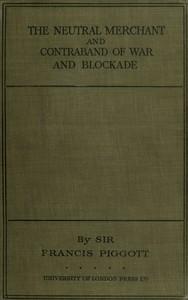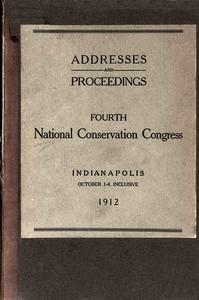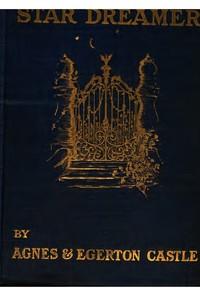|
|
Read this ebook for free! No credit card needed, absolutely nothing to pay.Words: 33203 in 7 pages
This is an ebook sharing website. You can read the uploaded ebooks for free here. No credit cards needed, nothing to pay. If you want to own a digital copy of the ebook, or want to read offline with your favorite ebook-reader, then you can choose to buy and download the ebook.

: The neutral merchant in relation to the law of contraband of war and blockade under the order in Council of 11th March 1915 by Piggott Francis Taylor - World War 1914-1918; Neutrality; Contraband of war; Blockade@FreeBooksThu 08 Jun, 2023 INTRODUCTION v THE NEUTRAL MERCHANT
The 'Letters of Historicus'--General Position of the Neutral Merchant--Use of Neutral Flags by Merchantmen to Escape Capture or Destruction--First American Note to Great Britain--British Interim Reply--The Complete Reply--First American Note to Germany--German Reply--Evolution of the Doctrines of Contraband of War and Blockade--Meaning of Neutrality--Contraband of War--Conditional Contraband--Declaration of Paris as to Freedom of Neutral Goods and of Enemy Goods under Neutral Flag--Prize Courts--The Conflicting Rights of Neutral Merchants and of Belligerents--The Right and Duty of Search--Doctrine of Continuous Voyages--Embargo--Blockade--The New Policy of the British Government--Foreign Enlistment--Proclamations of Neutrality. The neutral merchant is the centre round which the principal doctrines of international law dealing with neutrality have gathered. It seems strange at first that in time of war the commercial rights of a mere money-making civilian should invariably form the subject of endless discussions; but this civilian really holds a very important position in the waging of war; it could not go on without him. Each belligerent has need of him, and it is essential to each to prevent the other from satisfying that need. To block the enemy's communications with the neutral merchant is one of the surest ways of ending the war. To this end many ingenious things have been devised, and as many equally ingenious to counteract them; and in this the merchant's fertile brain has materially assisted. The problem is a complex one, for each belligerent as a buyer must strive to keep him in a good humour, but as a fighter must do all he can to thwart him. As for the neutral merchant himself, he is calmly indifferent to the merits of the fight; nothing pleases him so much as to be 'Jack of Both Sides.' He will take all he can get from one side and cry out for more from the other. When the War is over we may muse philosophically on some aspects of the Protest which the United States Government has addressed to Great Britain on behalf of its merchants; for the present, with all its serious issues hanging in the balance, the American Notes require careful study, for they themselves raise an issue as serious as any which the War has raised--whether Great Britain has been true to the principles she has so often preached, or whether the German accusation, or the American suggestion, that she has violated them can be substantiated; whether, when all is over, we shall be able to say proudly that it has been War with Honour. Two Notes have been addressed to Great Britain, and it will be convenient to refer at once to the second Note, which deals with the use by our merchantmen of neutral flags. The neutral merchant is directly concerned with this custom of the sea, for he may have cargo on board, and if this means of deceiving the enemy's warships is declared to be illegal he runs the chance of its being sent to the bottom. The Government of the United States reserved for future consideration the legality and propriety of the deceptive use of the flag of a neutral Power in any case for the purpose of avoiding capture; but pointed out that the occasional use of the flag of a neutral or of an enemy under stress of immediate pursuit, and to deceive an approaching enemy, was a very different thing from the explicit sanction by a belligerent Government for its merchant ships generally to fly the flag of a neutral Power within certain portions of the high seas which, it is presumed, will be frequented with hostile warships. A formal declaration of such a policy for the general misuse of a neutral's flag jeopardises the vessels of a neutral visiting those waters in a peculiar degree by raising the presumption that they are of belligerent nationality, regardless of the flag they may carry. The Note declared that the United States would view with anxious solicitude any such general use of its flag; it would afford no protection to British vessels, it would be a serious and constant menace to the lives and vessels of American citizens, and a measure of responsibility for their loss would be imposed on the Government of Great Britain. The reply of the British Government was short and to the point. It dwelt on the fact that the Merchant Shipping Act sanctions the use of the British flag by foreign merchantmen in time of war for the purpose of evading the enemy; that instances are on record when United States vessels availed themselves of this facility during the American Civil War, and that, therefore, it would be contrary to fair expectation if now, when the conditions are reversed, the United States and neutral nations were to grudge to British ships liberty to take similar action. 'The British Government,' it continued, 'have no intention of advising their merchant shipping to use foreign flags as a general practice, or to resort to them otherwise than for escaping capture or destruction.' Finally, the responsibility for the loss of neutral vessels in such circumstances must fall on the nation which had deliberately disregarded the obligations recognised by all civilised nations in connexion with the seizure of merchant ships. I pass now to the more serious matter of the Note of friendly protest of the 28th of December, which was an amplification of one already presented on the 7th of November. It opens with the declaration that the present condition of the trade of the United States, resulting from frequent seizures and detentions of cargoes destined to neutral European ports, has become so serious as to require a candid statement of the view of the United States Government that the British policy is an infringement of the rights of its citizens, and denies to neutral commerce the freedom to which it is entitled by the law of nations. An improvement had been confidently awaited on account of the statement of the Foreign Office that the British Government 'were satisfied with guarantees offered by the Norwegian, Swedish, and Danish Governments as to the non-exportation of contraband goods when consigned to named persons in the territories of those Governments.' But although nearly five months had passed since the War began, it was a matter of deep regret to find that the British Government have not materially changed their policy and do not treat less injuriously ships and cargoes passing between neutral ports in the peaceful pursuit of lawful commerce which belligerents should protect rather than interrupt. The greater freedom from detention and seizure which was confidently expected to result from consigning shipments to definite consignees rather than 'to order' is still awaited. Free books android app tbrJar TBR JAR Read Free books online gutenberg More posts by @FreeBooks
: Proceedings [of the] fourth National Conservation Congress [at] Indianapolis October 1-4 1912 by United States National Conservation Congress - Natural resources Congresses; United States Economic conditions Congresses; Conference papers and proceedings@FreeBooksThu 08 Jun, 2023
|
Terms of Use Stock Market News! © gutenberg.org.in2025 All Rights reserved.






